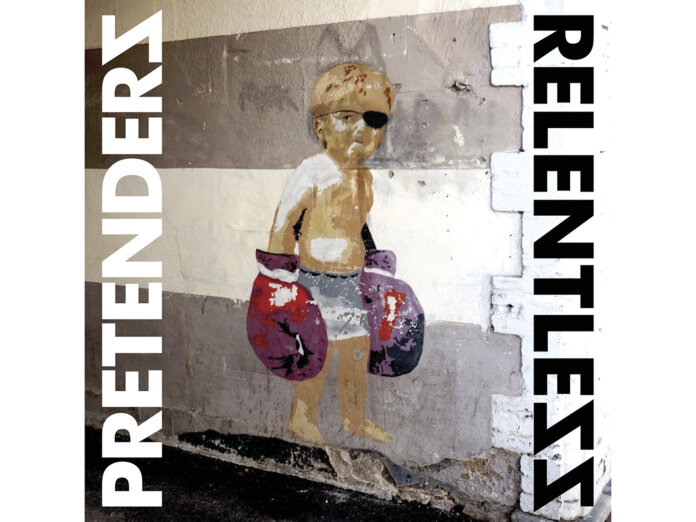Chrissie Hynde’s voice has always curled with contempt and sorrow, curt dismissal and self-critique. An ache is inbuilt, adding patented, wry hurt to the brisk, chiming pop of the Pretenders’ ’70s and ’80s hit parade. The band have meanwhile maintained creative consistency, proudly declared in the setlists of this year’s club tour, which sifted gold of comparable lustre from their songbook.
- ORDER NOW: The Who are on the cover of the latest UNCUT
That voice, like Hynde’s wiry, shaggy-haired silhouette, never really changes, though her writing hasn’t clung to youth. Turning 71 doesn’t mean, either, that Relentless joins the post-Time Out Of Mind genre of rockers stoutly confronting the Grim Reaper. Instead, Hynde and guitarist/co-writer James Walbourne have slowed their music down to take forensically precise snapshots of regret and dismay, as if dissecting emotional car crashes. Relentless often exists in sun-baked climes, dry heat making the singer squint to see the worst, searing air burning off delusion in pitilessly clear sky. “From San Francisco to Sydney, there’s no rain,” Hynde sings on “Your House Is On Fire”. Even “The Orlando Hotel in late November” in “The Promise Of Love”, with snow laying thick, offers only a different colour of piercing clarity. Lyrics about a world in turmoil, from climate change to national decline, become symptomatic backdrops for personal entropy. At the same time, as the album title suggests, this potent work leaves the current Pretenders fiercely resurgent.
“I must be going through a metamorphosis/A senile dementia or some kind of psychosis,” is how Hynde starts opener “Losing My Sense Of Taste”, over glowering storms of guitar. “I don’t even care about rock’n’roll/All of my favourites feel tired and old.” A major rock star equably pondering senility is less startling than the thought of Hynde losing the faith that first took her out of Akron, Ohio, driven by dreams of Brian Jones into London punk’s nascent heart. “I must be going through the motions at best,” she fears, before the next line’s relief: “I thought of you so much that it caused me unrest”. If her equilibrium is only unbalanced by a failed affair, while Walbourne’s guitars buck and squall regardless, maybe the grander claims are just a feint to write another love song. Yet the literary effect weds to the music, and doesn’t let up.
Guitars chime like classic Pretenders on “A Love”, as Hynde’s phrasing dips and soars, much as she mastered Dylan’s mazy words in her lockdown covers album, Standing In The Doorway. She assesses this song’s lover with sensuality and humour (“I’m not scared of your lovely mouth/It’s your words that get in the way, saying ordinary things…”). She’s not hemmed in thematically or linguistically by modern mores, viewing them through her own lens: “Domestic Silence” rhymes its title with “violence”, as the “hexed” singer is “blue one day and black the next”, the situation’s specifics mattering less to Hynde than immersion in another torrid romance. “I, I, I, I, I/Have one of those faces,” she truthfully concludes. Later, “Look Away” considers phone addiction over gently remorseless acoustic guitar. Avoiding septuagenarian incomprehension, the singer is fully implicated, begging to be saved from the virtual vortex. Sometimes she’d rather go blind, she states, than see childhood imaginations sullied. It’s a folk song, saved from foolishness by clenched vocal passion.
“The Copa” takes place under “vicious sun”, perhaps involving a simple holiday romance which ends in the modern indignity of an airport security queue, Hynde’s shoes shucked in case she’s a terrorist, the lover gone when she turns round. Unfolding over languid guitar strums, Hynde groans and glides to the reverie’s end. “Your House Is On Fire” finds its protagonist not only in a burning world but at the end of the line, in a stately epic of decline and betrayal, friends lost, feedback frequencies swaying like a last siren call, Hynde singing with husky finality.
She often observes characters more than confessing, and treats even age’s indignity with hardboiled toughness, relishing the drama – part Bogie, part Bacall. “Just Let It Go” and “Vainglorious” seem to reflect wryly on her own situation, the former with swooningly romantic music and lyrical realism (“I just did my job, and kept my head down”), the latter a 2½-minute rock’n’roll flashback, haunted by Halloween ululations and PiL-like guitar. “To live forever,” she adds on “Let The Sun Come In”, “that’s the plan.”
Relentless’s last song, “I Think About You Daily”, also reflects in mature repose on a life much like Hynde’s, with pride (“I was in my prime/…I took my chance, and I won”), then regret about those left behind. Jonny Greenwood’s arrangement is crucial. On what’s basically a piano ballad, his murmuration of strings swoop and clash, interweaving with Hynde as she stretches words on a rueful wrack. She has crooned before, but the freight of intimate emotion here, letting low notes waver within the ferally alive arrangement, is masterful. Ending an album of looking back, this is the new prime of Chrissie Hynde.



